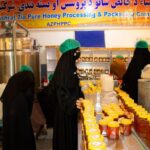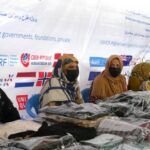UN agencies have issued a joint call for immediate, coordinated, and multi-sectoral actions regarding nutrition in Afghanistan to combat the crisis of malnutrition affecting women and children.
The statement highlights that Afghanistan is at a critical juncture in its fight against malnutrition among women and children, and immediate actions with support at global, national, and local levels are essential to save lives and mitigate the devastating effects of this ongoing crisis.
The announcement states that this call has been jointly issued by UNICEF, the World Health Organization, the World Food Programme, the Food and Agriculture Organization (FAO), and the United Nations Population Fund.
The issuers of this call provide a roadmap to strengthen the supportive environment for designing and implementing comprehensive food and nutrition policies aimed at preventing wasting, stunting, and other forms of malnutrition. The goal is to ensure early access to preventive services, integrated management of acute malnutrition, and improved access to healthy and nutritious diets.
Additionally, these organizations emphasize the need for the food, health, social protection, water, sanitation, and education sectors to become more sensitive and accountable to nutritional outcomes among children and women.
The call states that achieving these goals requires strengthening governance structures in the nutrition sector, including effective leadership, multi-sectoral coordination, a specialized workforce in nutrition, and generating strong evidence to inform policies and programs.
UN agencies have indicated that Afghanistan is among the 15 countries in the world with the highest rates of severe child malnutrition, with over 3.5 million children under five currently suffering from acute malnutrition, of which 1.4 million are at risk of death.
Furthermore, the call mentions that four out of ten women in Afghanistan are malnourished and are often overlooked in responses to this crisis.
According to the UN agencies’ call, nine out of ten young children in Afghanistan are experiencing “child food poverty” and lack access to the necessary dietary diversity for their growth and development.
The UN agencies have reported that high levels of food insecurity, primarily caused by a fragile economy and environmental disasters such as drought, have left 9.8 million people in a state of acute food insecurity.
The call quotes Edwin Sienaza Salvador, WHO representative in Afghanistan, stating: “Malnutrition is not just a health issue; it is a cycle that spans generations. When mothers are malnourished, there is a higher likelihood of low birth weight babies, which increases the risk of inadequate growth and developmental issues during childhood, adolescence, and adulthood.”
He added: “Breaking this cycle requires an active approach that focuses on both prevention and treatment at every stage of life.”
Following the cessation of U.S. financial aid and the reduction of humanitarian assistance from other countries, UN agencies have repeatedly warned of increasing malnutrition in Afghanistan.













